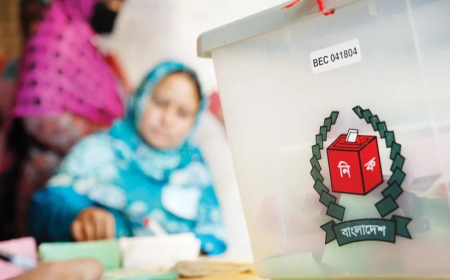The Erasure of Jahanara Imam
At SUST, Bangladesh has chosen to forget Jahanara Imam. It has chosen to betray its mother to appease its murderers. It has chosen to sanctify cowardice with religion. The dormitory that should have carried her name now bears the name of a saint, not because the country lacks martyrs, but because it lacks the courage to honor them.

History has a way of punishing nations that betray their martyrs. Bangladesh, born out of blood, fire, and the cries of millions in 1971, once promised to honor its dead and its heroes. Today, that promise lies in ruins at the Shahjalal University of Science and Technology in Sylhet, where a women’s dormitory that was meant to bear the name of Jahanara Imam -- the Mother of Martyrs, the conscience of a nation -- has been instead adorned with the name of a religious figure.
This is not just administrative housekeeping. This is the final act in a decades-long conspiracy to erase Jahanara Imam from public memory, a conspiracy orchestrated by Bangladesh Jamaat-e-Islami and abetted by the cowardice of successive governments. And now, shockingly, even the government of Professor Muhammad Yunus, installed after the July 2025 movement, has caved to the same dark influences and delivered Jamaat the victory they always wanted.
The story begins in 1999, when the SUST syndicate made what should have been the simplest decision in the world: to name student halls after Bangabandhu Sheikh Mujibur Rahman and Jahanara Imam. The symbolism was perfect. One was the Father of the Nation. The other was the Mother of Martyrs. Together they represented sacrifice and the moral foundation of Bangladesh. But Jamaat-e-Islami and its student wing, Islami Chhatra Shibir, erupted in fury. They claimed that placing Jahanara Imam’s name alongside Shah Jalal’s shrine would defile the saint. This was a grotesque lie. What they really feared was the daily reminder that their own leaders were collaborators, murderers, and facilitators of mass rape in 1971. To erase Jahanara Imam was to erase their own guilt.
Worse still, local Awami League leaders in Sylhet joined Jamaat’s protest. The very party that endlessly wraps itself in the Liberation War stood shoulder to shoulder with the collaborators to block the naming. The government postponed the decision, and in 2000 the president formally suspended it. Just like that, the Mother of Martyrs was cast aside.
When the Awami League returned to power in 2009 with a massive majority, they had every opportunity to restore the name and correct the injustice. They did nothing. They were too busy building dynastic cults and consolidating power, turning the Liberation War into a political monopoly while leaving its memory unprotected on campuses. To honor Jahanara Imam would have required courage, the courage to confront Jamaat on their breeding grounds. The Awami League never had that courage.
The years that followed were a slow-motion surrender. In 2013, a monumental 45-foot Liberation War sculpture was planned at the campus roundabout, depicting a mother blessing her son as he left for war. Islamist groups again screamed “religious offense.” The project was killed. The foundation stone still sits abandoned like an open wound. In 2015, teachers protesting corruption were beaten by the Awami League’s own student wing, the Bangladesh Chhatra League. The attackers shouted “Joy Bangla” while striking professors, desecrating the very slogan that once liberated the nation. Professor Muhammad Zafar Iqbal, soaked in rain, said he had never seen Joy Bangla so insulted in his life. In 2022, students went on hunger strike demanding the resignation of a corrupt vice chancellor. The government persuaded Zafar Iqbal to intervene, promising him the demand would be met. He trusted them, the students trusted him, and the strike ended. The government promptly betrayed them all.
Through these episodes runs a single thread: Bangladesh’s political class has learned to mouth the words of 1971 while gutting them of meaning. Jamaat supplied the venom. The Awami League supplied the cowardice. Together they ensured that Jahanara Imam would never be honored.
When the Awami League finally collapsed in 2025, many dared to hope that the new government of Professor Muhammad Yunus would act differently. Yunus, the Nobel laureate, carried global prestige and a reputation for moral authority. Perhaps, people thought, here was someone who could restore integrity to public life and finally enshrine Jahanara Imam’s name where it belonged. Instead, his government has presided over the final erasure. The women’s dormitory has been renamed after a religious figure, the classic Jamaat tactic of cloaking political crimes in sanctity.
This reeks of the influence of faculty and administrators aligned with Jamaat-e-Islami, who have always sought to erase reminders of their bloody past. That Yunus’s administration allowed this to happen exposes either stunning naivety or a dangerous willingness to appease the very forces that once tried to strangle the nation at birth. His government had every chance to reverse two decades of betrayal. Instead, it delivered the collaborators their greatest prize: the removal of the Mother of Martyrs from institutional memory.
The cowardice is staggering. Jahanara Imam gave her son and her husband to the Liberation War. She gave her pen, her diary, her voice, and her life to demand justice against war criminals. In return, the country has given her nothing but betrayal. From the BNP to the Awami League to the so-called reformist government of Yunus, every force in power has either actively blocked or silently permitted her erasure. The political class has proved that it is more comfortable with collaborators than with conscience.
Erasing Jahanara Imam is not just an insult to one woman. It rewrites the Liberation War itself. It emboldens Jamaat by telling them their strategy of hiding behind religion has worked. It tells women students that their foremothers’ sacrifices mean nothing. It tells teachers and intellectuals that their blood can be bargained away for expedience. It tells the world that Bangladesh has no courage left. And it leaves the Yunus government irredeemably stained. Yunus has built his international reputation on moral authority, on microcredit, on the language of empowerment. Yet under his leadership, Bangladesh has overseen the erasure of the woman who embodied empowerment more than any World Bank seminar or Davos panel ever could.
The erasure of Jahanara Imam is not administrative. It is not cultural. It is not neutral. It is a national disgrace. And Muhammad Yunus, for all his prizes and all his speeches, will now be remembered not as the man who restored decency to Bangladesh, but as the one who signed off on the final insult to its Mother of Martyrs. History will not forgive him. The people of Bangladesh should not either.
Bangladesh likes to call itself a nation born of sacrifice. But nations are defined not only by what they remember, but by what they choose to forget. At SUST, Bangladesh has chosen to forget Jahanara Imam. It has chosen to betray its mother to appease its murderers. It has chosen to sanctify cowardice with religion. The dormitory that should have carried her name now bears the name of a saint, not because the country lacks martyrs, but because it lacks the courage to honor them.
The erasure of Jahanara Imam is the erasure of Bangladesh’s conscience. Unless it is reversed, the country must admit what it has become: a nation willing to betray its mother to protect its killers. To my alma mater, Shahjalal University of Science and Technology: Shame on you.
Omar Shehab is a theoretical quantum computer scientist at the IBM T. J. Watson Research Center, New York. His work has been supported by several agencies including the Department of Defense, Department of Energy, and NASA in the United States. He also regularly invests in the area of AI, deep tech, hard tech, and national security. He is also an alumnus of the Shahjalal University of Science and Technology.
What's Your Reaction?












































































